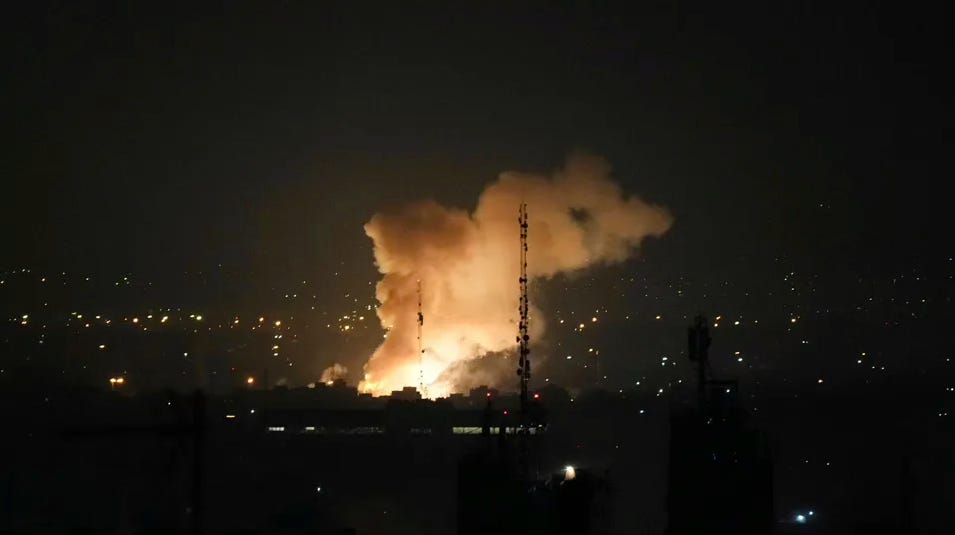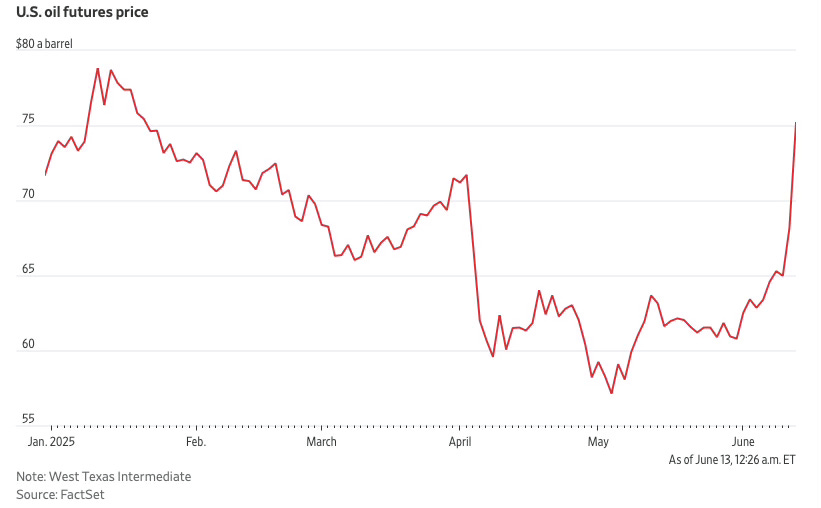Israel Launches Massive Strike on Iran’s Nuclear and Military Leadership
Trump administration officials distanced themselves from Israel's action as Middle East conflict expands.
Israel launched a unilateral military assault against Iran’s nuclear infrastructure, top military leadership, and nuclear scientists in a surprising and dramatic escalation with global ramifications of the conflict in the Middle East.
‘This is a huge development with dire, unpredictable consequences,’ Ali Akbar Dareini, a researcher in Tehran for the Center for Strategic Studies (CSS), based in Amman, Jordan, told Al Jazeera.
The size and scope of Israel’s attack on Iran was unprecedented. Israeli warplanes and covert units struck dozens of high-value targets overnight on 13 June, including Iran’s uranium enrichment plant at Natanz, ballistic missile sites, and the headquarters of the Islamic Revolutionary Guard Corps (IRGC) in Tehran. Iranian state media confirmed the death of IRGC commander Hossein Salami, along with two prominent nuclear scientists.
Israeli Prime Minister Benjamin Netanyahu said in a recorded address Iran’s nuclear program had posed a threat to Israel’s survival, calling the attack a ‘decisive moment’ in Israel’s history. Reports from Iran said the Israel air attacks had come in a series of waves. An Israeli military spokesman said 200 Israeli fighter jets had participated in striking some 100 targets in Iran.
Tehran has vowed a ‘harsh and decisive’ retaliation, with military officials warning that details of the response are being finalized ‘at the highest levels.’ Explosions were reported across the capital and near other sensitive sites. Iranian authorities declared several civilians, including children, were killed in Israeli strikes.
US Distances Itself
President Donald Trump and Secretary of State Marco Rubio denied any US involvement in the strikes. ‘We are not involved in strikes against Iran,’ Secretary of State Rubio said in a statement, emphasizing that Washington’s priority is ‘protecting American forces in the region.’
US officials are bracing for potential Iranian reprisals that could threaten US installations and personnel in the region. Trump will convene a National Security Council meeting at the White House on Friday morning.
Iran’s foreign ministry said the attack could not have happened without coordination and authorization’ from the United States.
Covert Action, Regional Shockwaves
Alongside the air campaign, Israel’s Mossad is believed to have coordinated sabotage operations targeting missile bases and air defense systems. Analysts say the scale and coordination of the assault suggest Israel is aiming to cripple Iran’s ability to produce a nuclear weapon in the near term.
The Israeli military claimed Friday that Iran was nearing a ‘point of no return’ in its pursuit of nuclear weapons, accusing the regime of building secret, fortified enrichment sites and amassing enough material for as many as 15 bombs.
‘Iran is typically capable of mounting a response within 24 hours, utilizing ballistic missiles and drones, but the military has not encountered this scale of destruction before,’ the Eurasia Group consultancy said in a note to clients.
Diplomacy in Ruins
The attack comes just days before a planned sixth round of nuclear negotiations between the US and Iran in Muscat, Oman, on a potential non-proliferation deal.
Tehran denies seeking a nuclear weapon, but has asserted its right under international law to domestically enrich uranium to produce nuclear fuel for civilian power production. US officials adopted the position Iran must give up its enrichment capabilities to ensure that it cannot obtain a nuclear weapons.
US envoy Steve Witkoff was expected to meet Iranian officials this weekend. But Iran now is likely to withdraw. A nonproliferation agreement between the US and Iran prohibiting Iran from developing nuclear weapons was reached during the Obama administration but Trump arbitrarily withdrew from it during his first term as president.
What’s Next
Analysts warn that Iran’s military response, likely involving missiles and drones, would come within 24 to 48 hours, though the deaths of senior commanders and damage inflicted on its missile sites may delay a response. Israeli military officials said Iran launched more than 100 drones against Israel in retaliation on Friday.
Benchmark US crude oil futures rose by more than 10 percent to trade at more than $75 a barrel and US stock market futures fell more than 1.5 percent overnight.
Iranian authorities informed the International Atomic Energy Agency that the Bushehr Nuclear Power Plant has not been targeted and that no increase in radiation levels has been observed at the Natanz site, the IAEA said.
Jordan and Iraq announced they had closed their airspace and Saudi Arabia condemned the Israeli attacks.
‘The Kingdom of Saudi Arabia expresses its strong condemnation and denunciation of the blatant Israeli aggressions against the brotherly Islamic Republic of Iran, which undermine its sovereignty and security and constitute a clear violation of international laws and norms,’ the Saudi foreign ministry said in a statement.
Netanyahu’s government has been at war against Hamas in Gaza for 615 days and has attacked Hezbollah in Lebanon, the Houthis in Yemen and remnants of Assad’s military in Syria. It is presently waging a campaign of starvation and extermination against Palestinians in Gaza where more than 45,000 people have been killed by the IDF.





